The Best of Paris
Best WalksLeft Bank Literary Loop
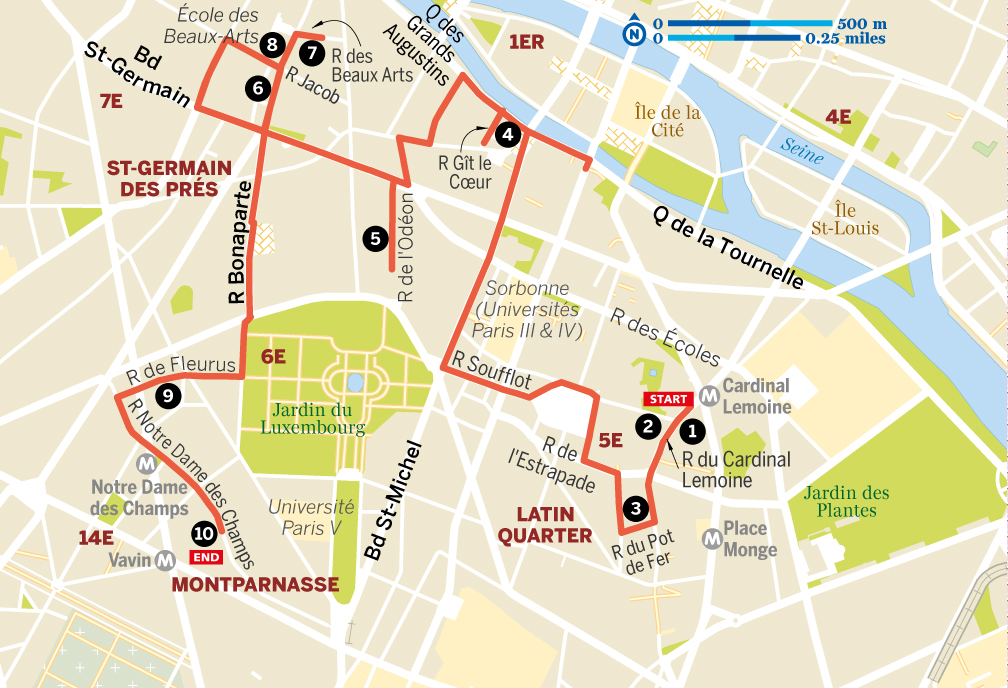
It wasn’t only Paris’ reputation for liberal thought and relaxed morals that lured writers in the early 20th century – Left Bank Paris was cheap and, unlike Prohibition-era America, you could drink to your heart’s content. This walk through the area’s long gentrified streets takes in pivotal places from the era.
Start Rue du Cardinal Lemoine; Cardinal Lemoine
Finish Rue Notre Dame des Champs; Vavin
Length 6.5km; three hours
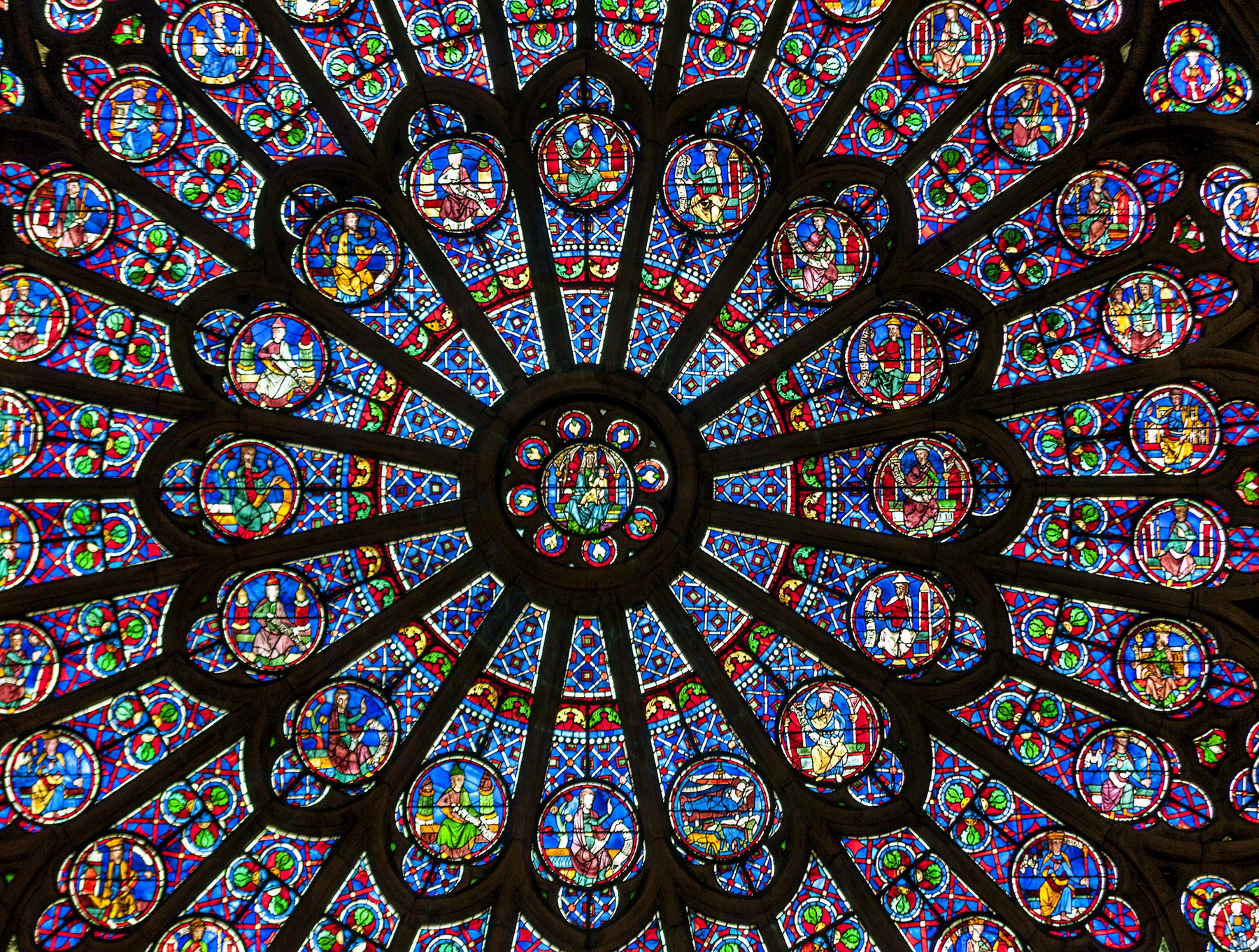
The route is littered with cafes and brasseries with literary associations, including favourites of Jean-Paul Sartre and Simone de Beauvoir Les Deux Magots (
MAP
GOOGLE MAP
; www.lesdeuxmagots.fr; 170 bd St-Germain, 6e; ![]() h7.30am-1am;
h7.30am-1am; ![]() mSt-Germain des Prés) and Café de Flore (
MAP
GOOGLE MAP
; 172 bd St-Germain, 6e;
mSt-Germain des Prés) and Café de Flore (
MAP
GOOGLE MAP
; 172 bd St-Germain, 6e; ![]() h7am-2am;
h7am-2am; ![]() mSt-Germain des Prés), Hemingway’s favoured La Closerie des Lilas (
MAP
GOOGLE MAP
;
mSt-Germain des Prés), Hemingway’s favoured La Closerie des Lilas (
MAP
GOOGLE MAP
; ![]() %01 40 51 34 50; www.closeriedeslilas.fr; 171 bd du Montparnasse, 6e; mains restaurant €28-55, brasserie €24-33;
%01 40 51 34 50; www.closeriedeslilas.fr; 171 bd du Montparnasse, 6e; mains restaurant €28-55, brasserie €24-33; ![]() hrestaurant noon-2.30pm & 7-11.30pm, brasserie noon-12.30am, piano bar 11am-1.30am;
hrestaurant noon-2.30pm & 7-11.30pm, brasserie noon-12.30am, piano bar 11am-1.30am; ![]() mVavin or RER Port Royal), and other literary-luminary magnets such as Le Dôme (
GOOGLE MAP
;
mVavin or RER Port Royal), and other literary-luminary magnets such as Le Dôme (
GOOGLE MAP
; ![]() %01 43 35 25 81; 108 bd du Montparnasse, 14e; mains €44-66.50, seafood platters €75;
%01 43 35 25 81; 108 bd du Montparnasse, 14e; mains €44-66.50, seafood platters €75; ![]() hnoon-3pm & 7-11.30pm;
hnoon-3pm & 7-11.30pm; ![]() mVavin).
mVavin).
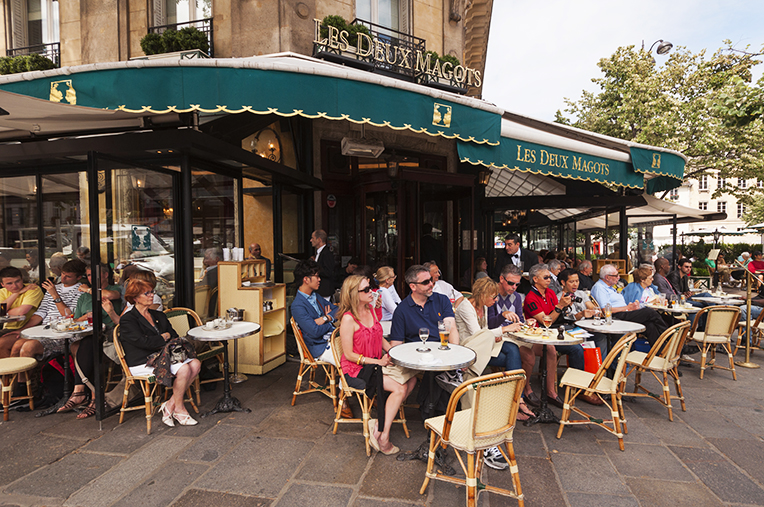
1 Rue du Cardinal Lemoine
Walk southwest along rue du Cardinal Lemoine, peering down the passageway at No 71, where James Joyce finished Ulysses in apartment E. From 1922 to 1923, Ernest Hemingway lived at No 74.
2 Paul Verlaine’s Garret
Hemingway wrote in a top-floor garret of a hotel at 39 rue Descartes – the same hotel where the poet Paul Verlaine died. Ignore the incorrect plaque.
3 George Orwell’s Boarding House
In 1928 George Orwell stayed in a boarding house above 6 rue du Pot de Fer, which he called ‘rue du Coq d’Or’ in Down and Out in Paris and London (1933).
4 Jack Kerouac’s Hotel
The Relais Hôtel du Vieux Paris at 9 rue Gît le Coeur was a favourite of poet Allen Ginsberg and Beat writer Jack Kerouac in the 1950s.
5 Shakespeare & Company
The original Shakespeare & Company bookshop stood at 12 rue de l’Odéon, where owner Sylvia Beach lent books to Hemingway and published Ulysses for Joyce in 1922. It was closed during WWII’s Nazi occupation.
6 Henry Miller’s Room
Henry Miller stayed on the 5th floor of 36 rue Bonaparte in 1930; he wrote about the experience in Letters to Emil (1989).
7 Oscar Wilde’s Hotel
The former Hôtel d’Alsace (now L’Hôtel), 13 rue des Beaux-Arts, is where Oscar Wilde died in 1900.
8 Hemingway’s First Night in Paris
Hemingway spent his first night in the city at the Hôtel d’Angleterre, 44 rue Jacob.
9 Gertrude Stein’s Home
Ezra Pound and Hemingway were among those entertained at 27 rue de Fleurus, where Gertrude Stein lived with Alice B Toklas.
a Rue Notre Dame des Champs
Pound lived at 70 bis rue Notre Dame des Champs, while Hemingway’s first apartment in this area was above a sawmill at No 113.
Best WalksSeine-Side Romantic Meander
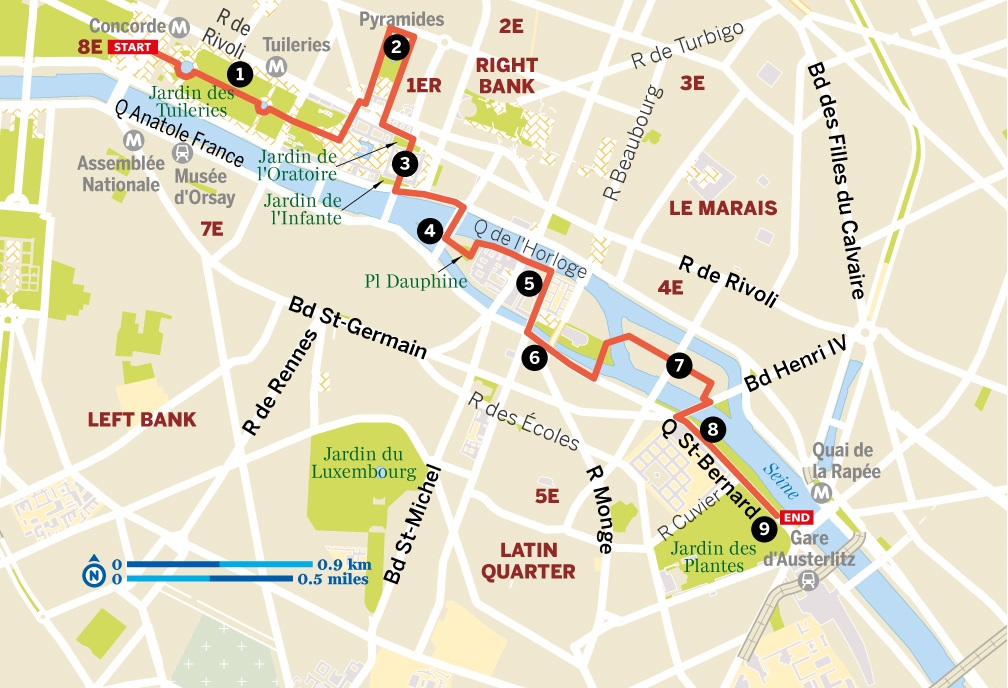
The world’s most romantic city has no shortage of beguiling spots, but the Seine and its surrounds are Paris at its most seductive. On this walk you’ll pass graceful gardens, palaces, intimate parks, a flower market and an enchanting bookshop. Descend the steps along the quays wherever possible to stroll along the water’s edge.
Start Place de la Concorde; Concorde
Finish Jardin des Plantes; Gare d’Austerlitz
Length 7km; three hours
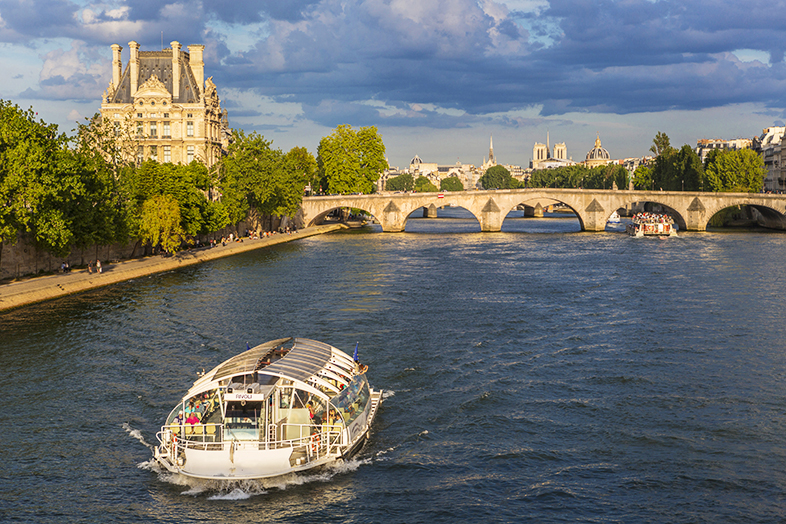
The Seine’s islands – Île de la Cité and Île St-Louis –have plenty of enticing places to eat and/or drink,such as Café Saint Régis (
MAP
GOOGLE MAP
; www.cafesaintregisparis.com; 6 rue Jean du Bellay, 4e; breakfast & snacks €3.50-14.50, mains €18-32; ![]() h8am-2am;
h8am-2am; ![]() W;
W; ![]() mPont Marie), as well as some picturesque picnic spots. Or simply leave it to serendipity (which is, after all, the essence of every great romance).
mPont Marie), as well as some picturesque picnic spots. Or simply leave it to serendipity (which is, after all, the essence of every great romance).
1 Jardin des Tuileries
After taking in the panorama from place de la Concorde, stroll through the Jardin des Tuileries.
2 Jardin du Palais Royal
Browse the arcades flanking the Jardin du Palais Royal, adjoining the 17th-century palace where Louis XIV once lived.
3 Cour Carrée
Walk through the Jardin de l’Oratoire to the Cour Carrée courtyard of the Louvre and exit at the Jardin de l’Infante (Garden of the Princess).
4 Square du Vert Galant
From the Pont Neuf, take the steps to the park at Île de la Cité’s tip, Square du Vert Galant, before ascending to place du Pont Neuf to cross place Dauphine.
5 Marché aux Fleurs Reine Elizabeth II
Parisians have been buying bouquets at the Marché aux Fleurs Reine Elizabeth II, newly renamed in honour of Britain’s Queen Elizabeth II, for centuries. Choose carefully: tradition has it that chrysanthemums are only for cemeteries, carnations bring bad luck, and yellow roses imply adultery.
6 Shakespeare & Company
Amid handpainted quotations, make a wish in the wishing well, leave a message on the ‘mirror of love’ or curl up with a volume of poetry in the reading library of the magical bookshop Shakespeare & Company.
7 Berthillon
Cross Pont de l’Archevêché to Île de la Cité, then take Pont St-Louis to Île St-Louis and share an ice cream from glacier (ice-cream maker) Berthillon.
8 Musée de la Sculpture en Plein Air
Along quai St-Bernard, wander among more than 50 late-20th century unfenced sculptures by artists such as César and Brancusi at the Musée de la Sculpture en Plein Air (Open-Air Sculpture Museum).
9 Jardin des Plantes
End your romantic meander at the tranquil Jardin des Plantes. For the ultimate denouement, cruise back along the Seine by Batobus.
Best WalksRight Bank Covered Passages
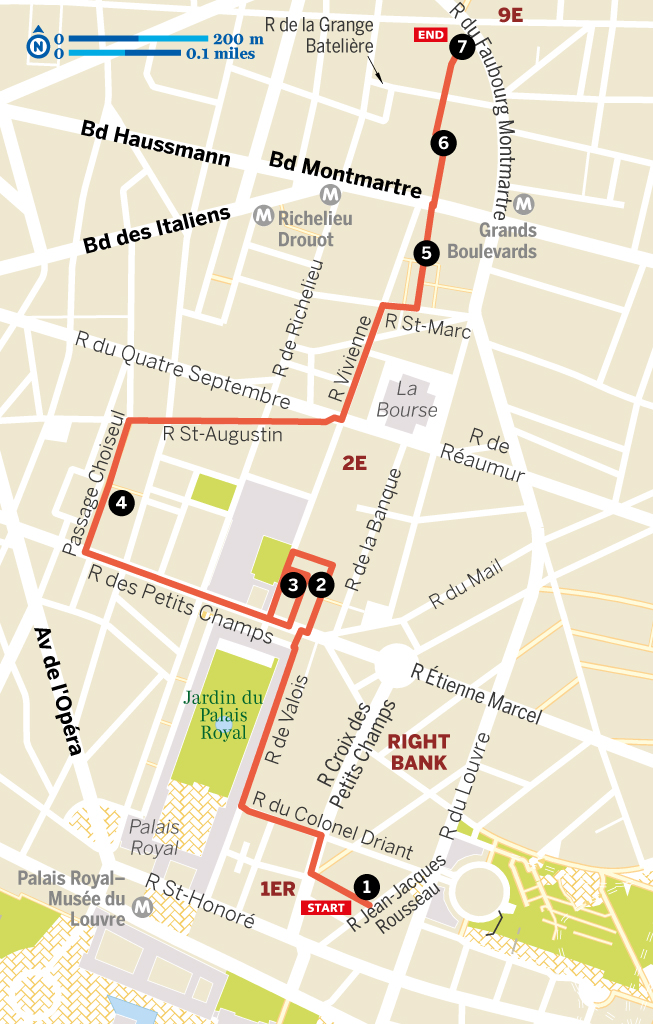
Stepping into the passages couverts (covered shopping arcades) of the Right Bank is the best way to get a feel for what life was like in early-19th-century Paris. Around half a century later, Paris had around 150 of these decorated arcades. This walking tour is tailor-made for a rainy day, but it’s best avoided on a Sunday, when some arcades are shut tight.
Start Galerie Véro Dodat; Palais Royal–Musée du Louvre
Finish Passage Verdeau; Le Peletier
Length 3km; two hours
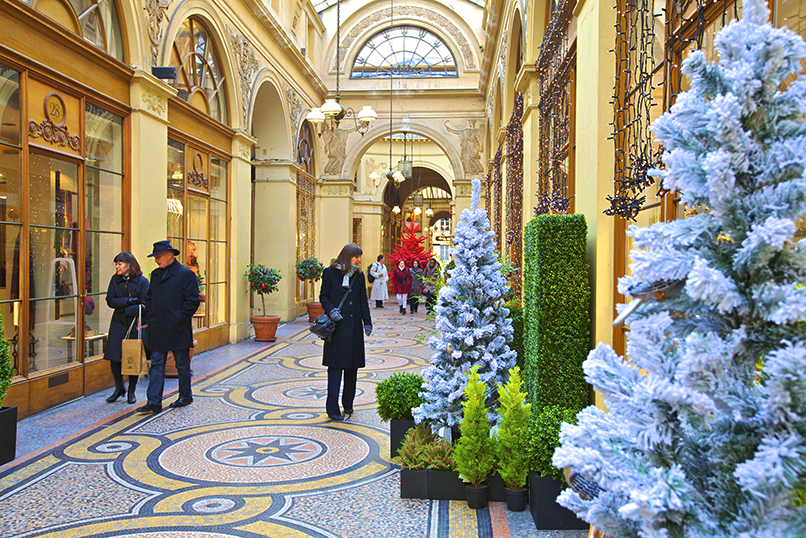
Like visitors 150 years ago, on this walk you can dine and drink within the arcades as well as shop and even attend the theatre. For a two-Michelin starred meal, book ahead to dine at Passage 53 (
MAP
GOOGLE MAP
; ![]() %01 42 33 04 35; www.passage53.com; 53 Passage des Panoramas, 2e; lunch/dinner menu €70/150;
%01 42 33 04 35; www.passage53.com; 53 Passage des Panoramas, 2e; lunch/dinner menu €70/150; ![]() hnoon-2.30pm & 8-10.30pm Tue-Sat;
hnoon-2.30pm & 8-10.30pm Tue-Sat; ![]() mGrands Boulevards, Bourse) inside the Passage des Panoramas.
mGrands Boulevards, Bourse) inside the Passage des Panoramas.
1 Galerie Véro Dodat
At 19 rue Jean-Jacques Rousseau, Galerie Véro Dodat retains its19th-century skylights, ceiling murals, Corinthian columns, tiled floor, gas globe fittings (now electric) and shopfronts including furniture restorers.
2 Galerie Vivienne
Built in 1826, Galerie Vivienne is decorated with floor mosaics and bas-reliefs on the walls. Don’t miss wine shop Legrand Filles & Fils, Wolff et Descourtis, selling silk scarves, and Emilio Robba, one of the most beautiful flower shops in Paris.
3 Galerie Colbert
Enter this 1826-built passage, featuring a huge glass dome and rotunda, from rue Vivienne. Exit on rue des Petits Champs (and check out the fresco above).
4 Passage Choiseul
This 1824-built, 45m long passage has scores of shops including many specialising in discount and vintage clothing, beads and costume jewellery as well as cheap eateries. Comedies are performed at the Théâtredes Bouffes Parisiens, which backs onto the passage’s northern end.
5 Passage des Panoramas
From 10 rue St-Marc, enter Paris’ oldest covered arcade (1800), the first to be lit by gas (1817). It was expanded in 1834 with four interconnecting passages – Feydeau, Montmartre, St-Marcand Variétés – and is full of eateries and unusual shops, such as autograph dealer Arnaud Magistry. Exit at 11 bd Montmartre.
6 Passage Jouffroy
Enter at 10-12 bd Montmartre into passage Jouffroy, Paris’ last major passage (1847). There’s a wax museum, the Musée Grévin, and wonderful boutiques including bookshops, silversmiths and M&G Segas, where Toulouse-Lautrec bought his walking sticks. Exit at 9 rue de la Grange Batelière.
7 Passage Verdeau
Cross the road to 6 rue de la Grange Batelière to the last of this stretch of covered arcades. There’s lots to explore: vintage comic books, antiques, old postcards and more. The northern exit is at 31 bis rue du Faubourg Montmartre.
BestMuseums
If there’s one thing that rivals a Parisian’s obsession with food, it’s art. More than 200 museums pepper the city, and whether you prefer the classicism of the Musée du Louvre, the impressionists of the Musée d’Orsay or detailed exhibits of French military history, you can always be sure to find something new just around the corner.
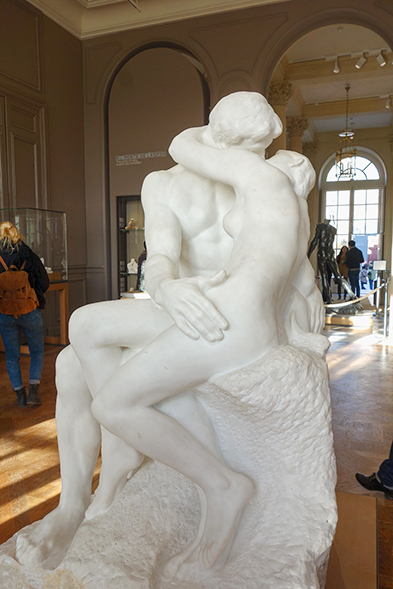
Planning Your Visit
Most museums close one day a week, generally Monday or Tuesday; many open late one or more nights a week – usually the least crowded time to visit. You’ll also save time by purchasing tickets online where possible. Remember that the cut-off for entry to museums is typically half an hour to an hour before the official closing times (including times listed in this guide). Audioguides are sometimes included with admission but often incur an extra charge.
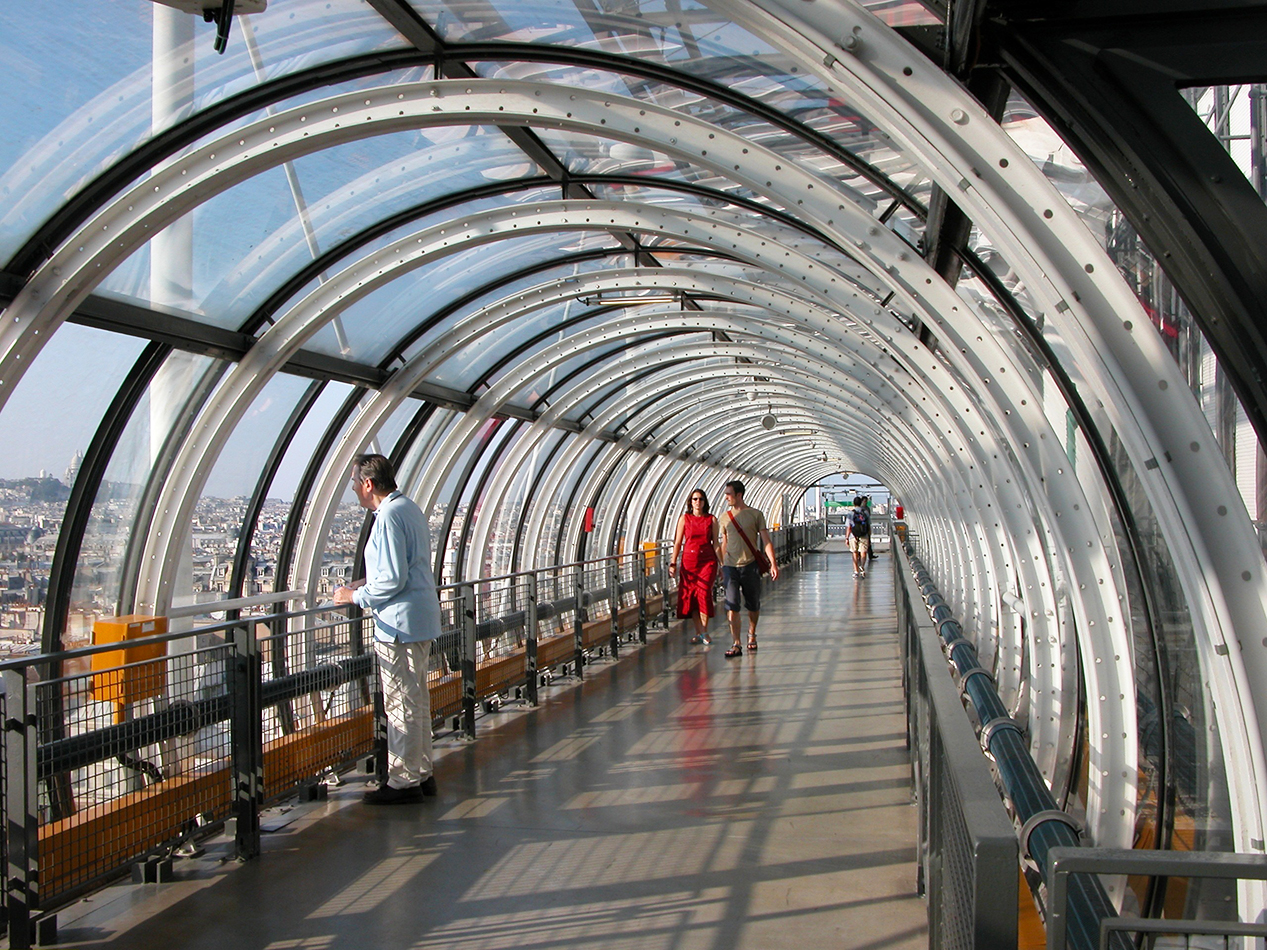
National Museums Free Entry
If you can, time your trip to be here on the first Sunday of the month, when you can visit the musées nationaux (national museums; www.rmn.fr) as well as a handful of monuments for free (some during certain months only). Temporary exhibitions still incur a charge.
City Museums Free Entry
You can visit the permanent collections of most musées municipaux (city-run museums; www.paris.fr) for free any time. Temporary exhibitions incur a charge.
Best Impressionist Collections
Musée d’Orsay France’s national museum for impressionist and related artistic movements is a must.
Musée de l’Orangerie Monet conceived a stunning cycle of his Water Lilies series especially for this building.
Best Modern- & Contemporary-Art Museums
Musée National d’Art Moderne The country’s national modern- and contemporary-art museum, located within the striking Centre Pompidou.
Musée d’Art Moderne de la Ville de Paris Paris’ modern-art museum spans the 20th century to the present day.
Espace Dalí Showcases the work of the surrealist master.
Best Photography Museums
Jeu de Paume France’s national photography centre.
Fondation Henri Cartier-Bresson Excellent photography displays and exhibitions.
Best Sculpture Museums
Musée Rodin Rodin’s former mansion-set workshop and its rose gardens contain his masterworks.
Musée de la Sculpture en Plein Air Over 50 late 20th-century unfenced sculptures by artists including César and Brancusi.
BestArchitecture
Several key eras define Paris’ cityscape. From the 11th-century, magnificent cathedrals and palaces were built. Baron Haussmann’s demolition of the city’s disease-ridden streets made way for boulevards lined by neoclassical buildings. And, after the art nouveau movement, additions centred on French presidents’ bold grands projets (great projects). For an architectural overview, visit the Cité de l’Architecture et du Patrimoine.
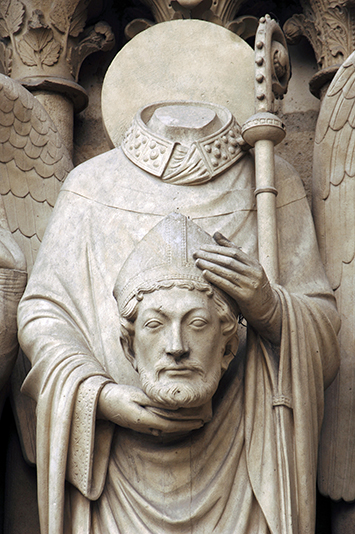
Haussmann’s Renovation
Paris’ appearance today is largely the work of Baron Georges-Eugène Haussmann (1809–91). Under Napoléon III, Haussmann completely rebuilt swathes of Paris between 1853 and 1870, replacing chaotic narrow streets (easy to barricade in an uprising) with arrow-straight, wide thoroughfares, including the 12 avenues radiating out from the Arc de Triomphe.
Art Nouveau Influence
Art nouveau swept through the Parisian cityscape from the mid-19th century until WWI, leaving its mark on architecture, interior design, furniture and graphics. Sinuous swirls, curls and floral tendrils characterise this ‘new art’ movement; materials that supported its signature motifs included wrought iron, glass, richly grained timbers and marble.
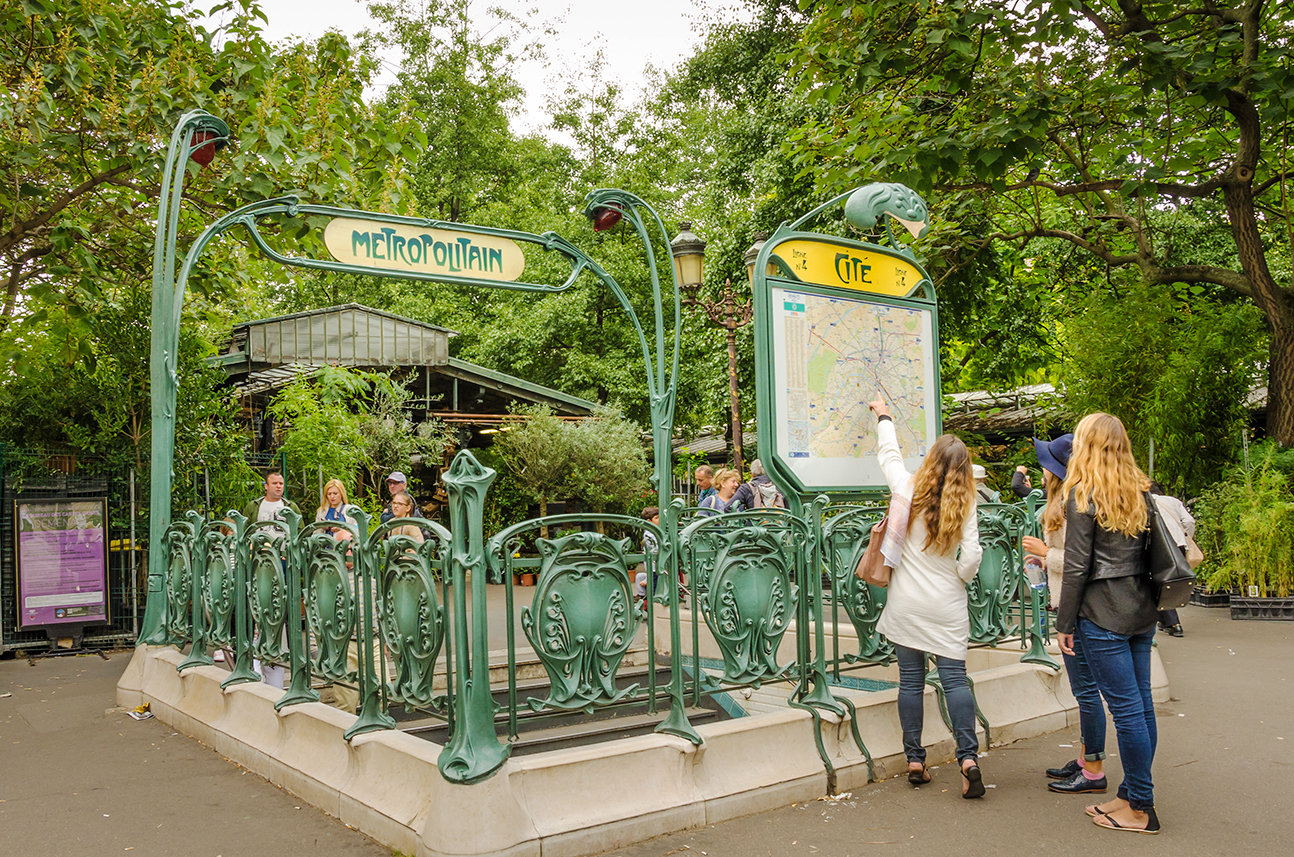
Rising Skyline
The outrage over the construction of the 1970s eyesore Tour Montparnasse prompted a clampdown on skyscrapers. However, due to Paris’ chronic lack of housing space, the city council approved raising height limits to 180m in some areas. Advocates include Pritzker Prize–winning French architect Jean Nouvel (b 1945).
Best Medieval Marvels
Notre Dame This incomparable medieval cathedral is the city’s heart in every sense.
Musée National du Moyen Âge The 15th-century Hôtel de Cluny is a medieval treasure.
Best Art Nouveau Splendours
Eiffel Tower Paris’ ‘iron lady’ is art nouveau at its best.
Abbesses metro entrance Hector Guimard’s finest remaining metro entrance.
Bofinger Dine amid art nouveau brass, glass and mirrors in Paris’ oldest brasserie.
Best Grands Projets
Centre Pompidou Former president Georges Pompidou’s now-beloved cultural centre sparked a furore when it was unveiled in 1977.
Louvre glass pyramid IM Pei’s pyramid, instigated by former president François Mitterrand, likewise created an uproar in 1989.
Opéra Bastille Mitterrand oversaw a slew of other costly projets, including the city’s second, state-of-the-art opera house.
Best Jean Nouvel Buildings
Musée du Quai Branly President Jacques Chirac’s pet projet, designed by Nouvel.
Institut du Monde Arabe The building that established Nouvel’s reputation blends modern and traditional Arab elements with Western influences.
Fondation Cartier pour l’Art Contemporain Stunning contemporary-art space.
Best Contemporary Structures
Cinémathèque Française Frank Gehry–designed postmodern stunner housing two cinema museums and presenting screenings.
Forum des Halles Epicentral shopping mall now topped by a giant rainforest-inspired canopy.
BestHistory
Paris’ history is a saga of battles, bloodshed, grand-scale excesses, revolution, reformation, resistance, renaissance and constant reinvention. But this epic is not just consigned to museums and archives: reminders of the capital’s and the country’s history are evident all over the city.
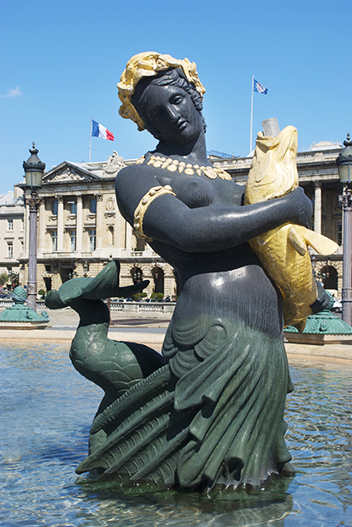
Early Beginnings
Paris was born in the 3rd century BC, when the Parisii tribe of Celtic Gauls established a fishing village in the area. Julius Caesar ended centuries of conflict between the Gauls and Romans in 52 BC. Christianity was introduced in the 2nd century AD; in 508 Frankish king Clovis I united Gaul and made Paris his seat.
Conflicts
In the 12th century Scandinavian Vikings pushed towards Paris, heralding the Hundred Years’ War with Norman England, which resulted in England gaining control of France in 1420. In 1429 Joan of Arc rallied French troops to defeat the English.
Revolution
The excesses of Louis XIV and his heirs triggered an uprising of Parisians on 14 July 1789, which kick-started the French Revolution. The government was consolidated in 1799 under Napoléon Bonaparte, who then conquered most of Europe before his defeat at Waterloo.
Reformation & Beyond
At the behest of Napoléon III, Baron Haussmann reshaped the cityscape. However, when Parisians heard of Napoléon III’s capture in the war with Prussia in 1870, they demanded a republic. It gave rise to the glittering belle époque (‘beautiful era’), which advanced arts and sciences.
Best Roman Legacies
Musée National du Moyen Âge Incorporates the remains of Gallo-Roman baths c AD 200.
Arènes de Lutèce Gladiatorial 2nd-century amphitheatre.
Best Medieval Milestones
Notre Dame Completed in the early 14th century.
Louvre Vast 12th-century fort turned palace turned museum.
Sainte-Chapelle Consecrated in 1248.
Sorbonne University founded in 1253.
Musée National du Moyen Âge Partly housed in the 15th-century Hôtel de Cluny.
Best Revolutionary Sights
Place de la Bastille Site of the former prison stormed on 14 July 1789, mobilising the Revolution.
Versailles The October 1789 March on Versailles forced the royal family to leave the château.
Place de la Concorde Louis XVI and his queen, Marie Antoinette, were among thousands guillotined where the obelisk now stands.
Conciergerie Marie Antoinette was one of the aristocrats tried and imprisoned here.
Parc du Champ de Mars This former military training ground was the site of revolutionary festivals.
Best Burial Places
Père Lachaise The world’s most visited cemetery, with famous graves and time-honoured tomb traditions.
Cimetière du Montparnasse More famous graves, south of St-Germain des Prés.
Cimetière de Montmartre Yet more famous graves, west of Sacré-Cœur.
Les Catacombes Prowl the skull- and bone-packed tunnels of Paris’ creepy ossuary.
Panthéon France’s greatest thinkers are laid to rest in this immense mausoleum.
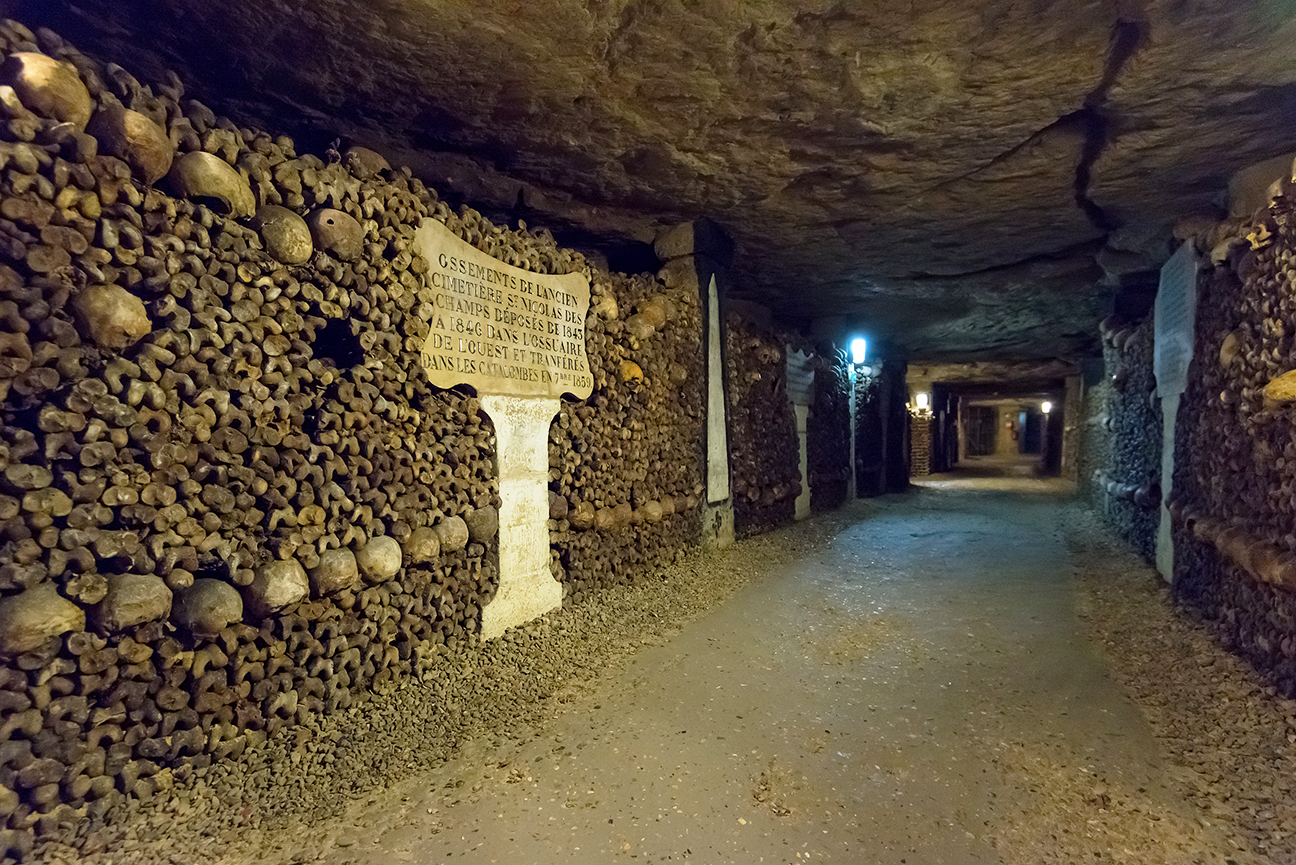
BestParks & Gardens
If Paris’ cafes are the city’s communal lounge rooms, its parks, gardens and squares are its backyards. The larger parks are idyllic for strolling or simply soaking up the sunshine, with plenty of seating as well as kiosks and cafes, while small, secret gardens are tucked between historic stone buildings or even perched in the middle of the Seine.
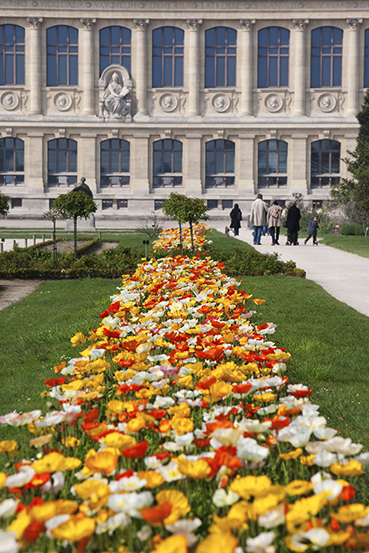
Best Traditional Gardens
Jardin du Luxembourg Paris’ most popular park.
Jardin des Tuileries Part of Paris’ historic axis and as classical as it gets.
Versailles Designed by André Le Nôtre, the château’s gardens are fit for a king.
Best Parks
Promenade Plantée The world’s first elevated park, atop a disused railway viaduct.
Jardin des Plantes Paris’ botanic gardens include peony and rose gardens, an alpine garden, greenhouses and more.
Parc des Buttes Chaumont Hilly, forested haven with grottoes, waterfalls, a lake and an island.
Place des Vosges Paris’ prettiest square, ringed by cloisters, with a park at its centre.
Best Hidden Gems
Square du Vert-Galant Romantically situated on the tip of the Île de la Cité.
Jardin de la Nouvelle France Enchanting little oasis between some of Paris’ busiest boulevards.
Île aux Cygnes A treeshaded walkway runs the length of the city’s little-known third island.
BestOf the Seine
La ligne de vie de Paris ('the lifeline of Paris'), the Seine, sluices through the city, spanned by 37 bridges. Its Unesco World Heritage–listed riverbanks offer picturesque promenades, parks, activities and events, including sandy summertime beaches. After dark, watch the river dance with the watery reflections of city lights and tourist-boat floodlamps. You are in Paris.
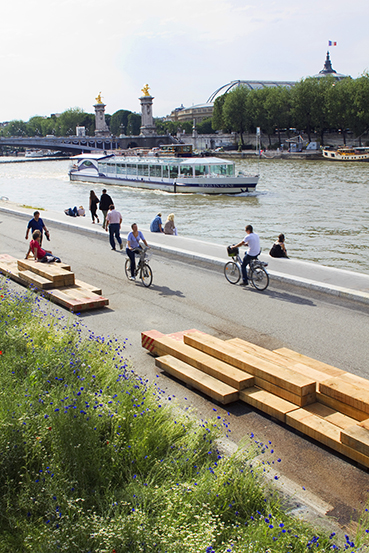
Riverbank Rejuvenation
Paris' riverbanks have been reborn in recent years. On the Right Bank, east of the Hôtel de Ville, the former expressway is now home to walkways and cycleways. On the Left Bank from the Pont de l’Alma to the Musée d’Orsay (linked to the water’s edge by a grand staircase that doubles as amphitheatre seating), the car-free stretch Les Berges de Seine (
GOOGLE MAP
; btwn Musée d’Orsay & Pont de l’Alma, 7e; ![]() hinformation point noon-7pm Sun-Thu, 10am-10pm Fri & Sat May-Sep, shorter hours Oct-Apr;
hinformation point noon-7pm Sun-Thu, 10am-10pm Fri & Sat May-Sep, shorter hours Oct-Apr; ![]() mSolférino, Assemblée Nationale, Invalides) is now a Parisian hot spot for outdoor activities.
mSolférino, Assemblée Nationale, Invalides) is now a Parisian hot spot for outdoor activities.
Paris Plages
Palm trees, bars, cafes, sun lounges, parasols, water sprays and sand line the river from mid-July to early September during the ‘Paris Beaches’.
Best River Cruises
Bateaux-Mouches The largest river cruise company in Paris and a favourite with tour groups. Cruises (70 minutes) run regularly from 10.15am to 10.30pm April to September and 13 times a day between 11am and 9.20pm the rest of the year. Commentary is in French and English. It's located on the Right Bank, just east of the Pont de l’Alma.
Vedettes de Paris It might be a small company, but its one-hour sightseeing cruises on smaller boats are second to none. It runs themed cruises too, including imaginative 'Mysteries of Paris' tours for kids (adult/child €14/8).
BestChurches
Some of the city’s most magnificent buildings are its churches and other places of worship. Not only exceptional architecturally and historically, they also contain exquisite art, artefacts and other priceless treasures. And best of all, entry to general areas within them is, in most cases, free.
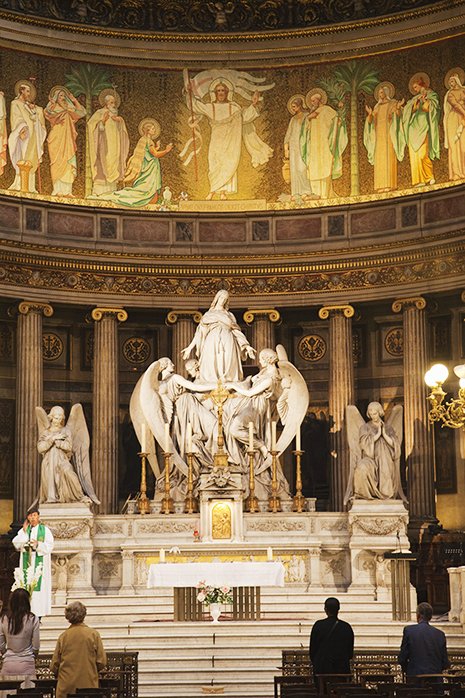
Classical Concerts
Paris’ beautiful, centuries-old stone churches have magnificent acoustics and provide a meditative backdrop for classical-music concerts. Posters outside churches advertise upcoming events with ticket information, or visit www.ampconcerts.com, where you can make online reservations. Tickets cost around €23 to €30.
Etiquette
Bear in mind that, although many of Paris’ places of worship are also major tourist attractions, Parisians come here to pray and celebrate significant events on religious calendars as part of their daily lives. Be respectful: keep noise to a minimum, obey photography rules (check signs), dress appropriately and try to avoid key times (eg Mass) if you’re sightseeing only.
Best Landmark Churches
Notre Dame The city’s mighty Gothic cathedral is without equal.
Sacré-Cœur Paris’ domed basilica lords over the city.
Église St-Sulpice Featured in The Da Vinci Code, with frescoes by Eugène Delacroix.
Église St-Germain des Prés Built in the 11th century, this is Paris’ oldest church.
Best Churches for Classical Concerts
Sainte-Chapelle Concerts provide the perfect opportunity to appreciate Sainte-Chapelle’s beauty.
Église de la Madeleine Renowned for its monumental organ.
Église St-Eustache Concerts have long been a tradition at this beautiful central church.
Best Non-Christian Places of Worship
Mosquée de Paris Paris’ 1920s art deco, Moorish tiled mosque has a wonderful tearoom and hammam (steambath).
Art nouveau synagogue Designed in 1913 by Hector Guimard.
BestPanoramas
Paris is a photographer’s dream. In addition to close-up shots of local street life, there are spectacular vantage points where you can snap vistas of the city – from the top of monuments, on hilltops, in vast squares and on bridges. Even without a camera, the views are unforgettable. Stroll around and you’ll find your own favourite panoramas of Paris.
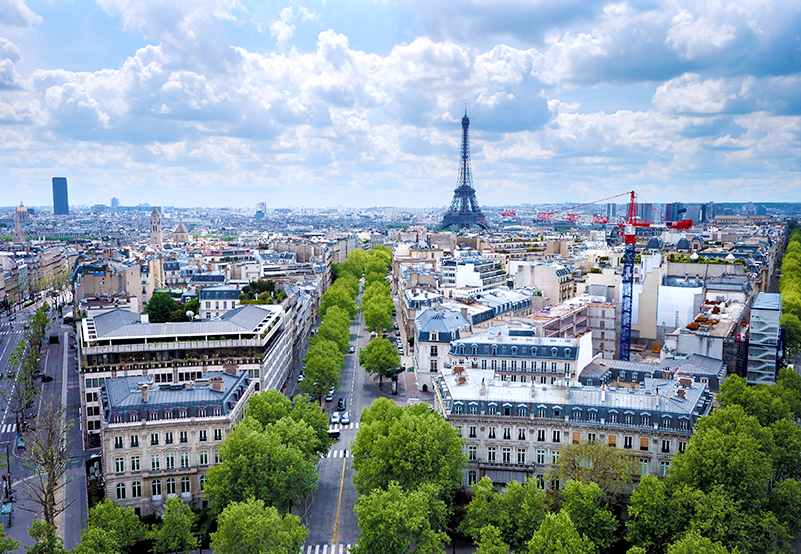
Best Buildings with a View
Eiffel Tower Not only the city’s most iconic building but also its highest.
Tour Montparnasse The saving grace of this otherwise-hideous high-rise is its panoramic observation deck.
Arc de Triomphe Climb to the top for the best views along Paris’ historic axis.
Centre Pompidou Captivating views of Paris, including the Eiffel Tower.
Galeries Lafayette Incredible views of Paris unfold from this department store’s rooftop – and they’re free!
Le Printemps This magnificent department store also has mesmerising rooftop views for free.
Cité de l’Architecture et du Patrimoine Amazing Eiffel Tower views unfurl from the windows and terrace out front.
Best Open Spaces with a View
Île aux Cygnes Walk west to east along this artificial island for breathtaking Eiffel Tower views.
Promenade Plantée Get a bird’s-eye view of local Parisian life three storeys up along this elevated park.
BestEating
France pioneered what is still the most influential style of cooking in the Western world and Paris is its showcase par excellence. Colours, textures and garnishes are impeccably arranged everywhere from simple restaurants to haute cuisine establishments helmed by legendary chefs. The city doesn’t have its own ‘local’ cuisine but is the crossroads for France’s regional produce and flavours.
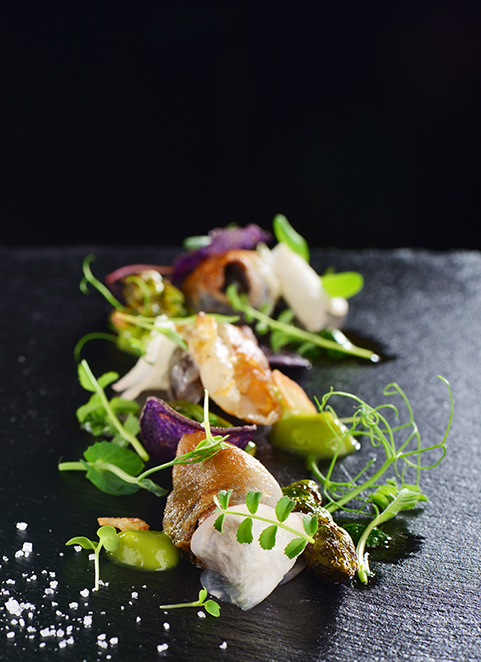
Evolving Trends
In addition to classical French fare, look out for cuisines from around the globe. Neobistros offer some of Paris’ most exciting dining options. Generally small and relatively informal, they’re run by young, talented chefs who aren’t afraid to experiment. Exclusively vegetarian establishments are emerging but still rare.
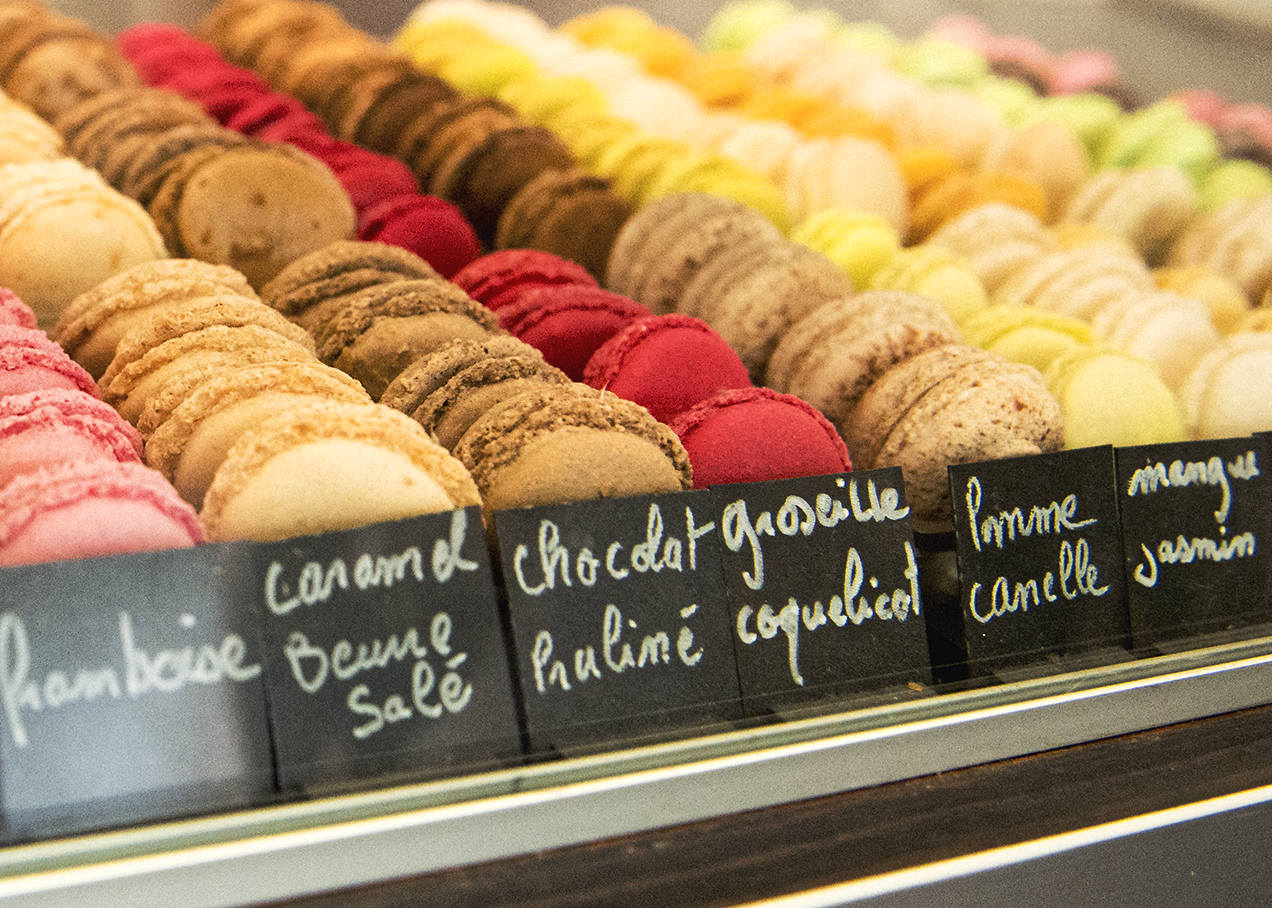
Dining Times
Breakfast (usually a baguette with butter and jam, and strong coffee) is seen as a mere precursor to lunch, the traditional main meal, starting around 12.30pm. Most restaurants open for dinner around 7pm or 7.30pm. Some high-end restaurants close at weekends, and many places close in August.
Menus
Eateries usually serve a plat du jour (dish of the day) at lunch (and occasionally at dinner), as well as menus (fixed-price meals) of an entrée (starter), plat (main course) and fromage (cheese) or dessert or both. These offer infinitely better value than ordering à la carte. Meals are often considerably cheaper at lunch than dinner.
Best Bistros
Le Bistrot Paul Bert Timeless vintage decor and perfectly executed classics.
Le Pantruche Superb, great-value modern French cuisine.
Chez Dumonet (Joséphine) The Parisian bistro of your dreams.
Frenchie Hidden alleyway bistro serving sensational menus.
Le Miroir Stylish, creative bistro fare.
Best Gastronomic Extravaganzas
Restaurant David Toutain Mind-blowing mystery degustation menus.
Yam’Tcha Exquisitely fused French and Asian flavours, paired with teas.
La Tour d’Argent Centuries-old establishment overlooking Notre Dame serving signature pressed duck.
Best Picnic Fare
La Grande Épicerie de Paris Dazzling gourmet emporium.
Chambelland Exquisite gluten-free baked goods and sandwiches to take away.
Best Boulangeries
Poilâne Turning out distinctive wood-fired, rounded sourdough loaves since 1932.
Besnier Watch baguettes being made through the viewing window.
Huré Contemporary bakery near Notre Dame.
BestMarkets
Nowhere encapsulates Paris’ village atmosphere more than its markets. Not simply places to shop, the city’s street markets are also social gatherings for the entire neighbourhood. Residents toting quintessentially Parisian canvas shopping bags on wheels chat with neighbours, fellow shoppers and stallholders and pick up culinary tips. Flea markets are full of antique, vintage and new treasures.
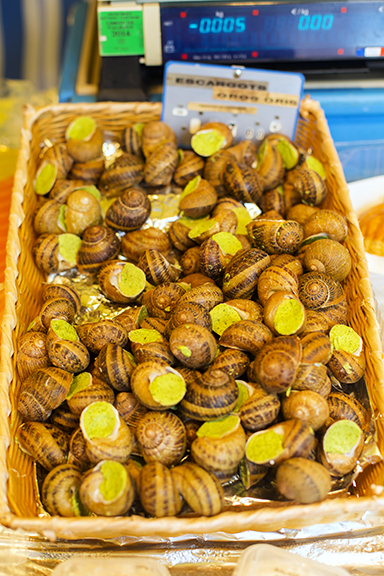
Street Markets
Nearly every little quarter has its own street market, held at least once a week, where tarpaulin-topped trestle tables bow beneath spit-roasted poultry, seafood on beds of crushed ice, meat, cheeses, sun-ripened fruit and vegetables, and pâtés, preserves and other delicacies. Many markets also sell clothes, accessories, homewares and more. Marchés biologiques (organic markets) abound.
Flea Markets
Exquisite antiques, vintage and retro clothing, jewellery, bric-a-brac, cheap brand-name clothing, footwear, African carvings, DVDs and electronic items are laid out at the city’s colourful flea markets. Watch out for pickpockets! Just north of Montmartre, Marché aux Puces de St-Ouen (
GOOGLE MAP
; www.marcheauxpuces-saintouen.com; rue des Rosiers; ![]() hvariable;
hvariable; ![]() mPorte de Clignancourt) has more than 2500 stalls.
mPorte de Clignancourt) has more than 2500 stalls.
Best Markets
Marché Bastille One of the city’s largest, liveliest street markets laden with quality produce.
Marché des Enfants Rouges Paris’ oldest covered market, with communal tables for lunch.
Marché aux Puces d’Aligre Central flea market adjoining the wonderfully chaotic Marché d’Aligre.
BestFor Kids
Parisians adore les enfants (children) and welcome them with open arms just about everywhere. You’ll notice French kids are generally quiet and polite, and you’ll be expected to make sure yours are, too. But kids can still burn off plenty of energy: central Paris’ residential design means you’ll find playground equipment in parks and squares throughout the city.
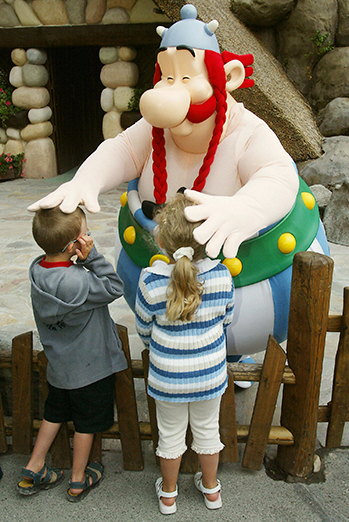
Dining with Kids
Many restaurants accept little diners (confirm ahead). Children’s menus aren’t widespread, however, and most restaurants don’t have highchairs. In fine weather, pick up sandwiches and crêpes from a street stall or pack a market-fresh picnic and head to the city’s parks and gardens.
Accommodating Kids
Parisian buildings’ limited space often means premium-priced family-size accommodation – apartments may be more economical. Check availability and costs for a lit bébé (cot).
Amusement Parks
Just outside central Paris are several amusement parks. The most high-profile is Disneyland Resort Paris (www.disneylandparis.com); French alternatives include Parc Astérix (www. parcasterix.fr) and, for tots, the adorable Jardin d’Acclimatation (www.jardindacclimatation.fr).
Best Attractions for Kids
Le Grand Rex Kids can become movie stars on entertaining behind-the-scenes tours.
Aquarium de Paris Cinéaqua Shark tank!
Jardin du Luxembourg Pony rides, puppet shows and more.
Vedettes de Paris Special ‘Paris Mystery’ Seine cruises for kids.
BestDrinking
For Parisians, drinking and eating go together like wine and cheese, and the line between a cafe, salon de thé (tearoom), bistro, brasserie, bar and even a bar à vins (wine bar) is blurred, while the line between drinking and clubbing is often nonexistent – a cafe that’s quiet mid-afternoon might have DJ sets in the evening and dancing later on.
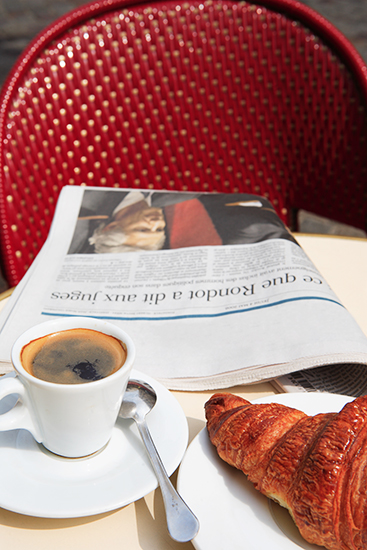
Cafe Culture
Paris’ cafes have long been the city’s communal lounge rooms: places to meet friends, read, write, philosophise, flirt and fall in – and out of – love.
Coffee
If you order un café (a coffee), you’ll be served a single shot of espresso. A café allonge is lengthened with hot water, a café au lait comes with milk and a café crème, lengthened with steamed milk, is the closest to a latte. The city is in the throes of a coffee revolution, with local roasteries like Belleville Brûlerie and Coutume priming cafes citywide for outstanding brews made by professional baristas, often using cutting-edge extraction techniques.
Wine
Wine is easily the most popular beverage in Paris and house wine invariably costs less than bottled water. Les vins naturels (natural wines) contain little or no sulphites.
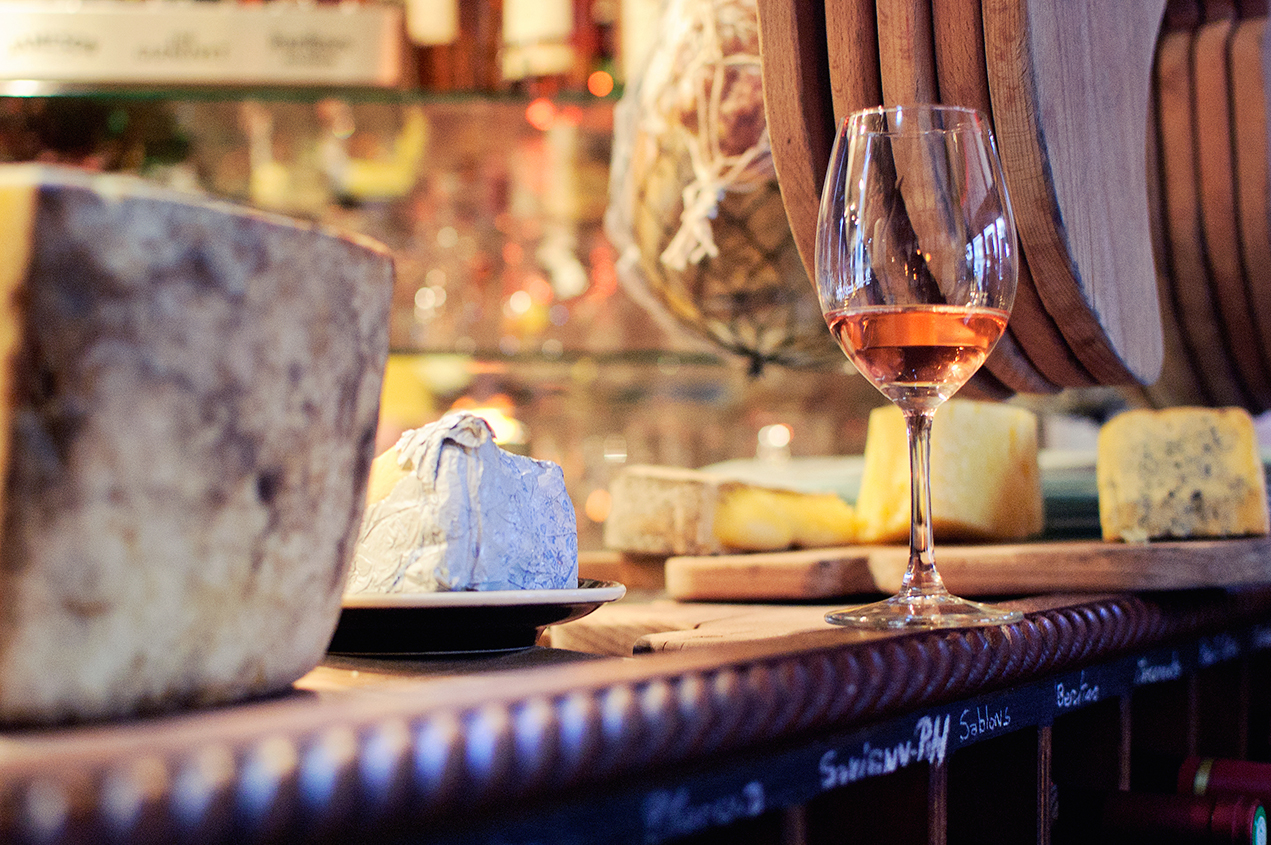
Cocktails
Cocktail bars are undergoing a resurgence; many hip restaurants pair cocktails with food. Paris Cocktail Week (www.pariscocktailweek.fr) takes place in late January.
Best Neighbourhood Cafes
Le Pure Café Still as quintessentially Parisian as Ethan Hawke’s character found it in Before Sunset.
La Fée Verte Absinthe specialist.
Le Progrès Montmartre local.
Best Coffee
Coutume Artisan roasters of premium beans, with a fab flagship cafe.
La Caféothèque Maze of a coffee house with serious tasting notes and seating made for lounging all day.
Lockwood Belleville-roasted beans.
Best Wine Bars
Le Baron Rouge Wonderfully convivial barrel-filled spot.
Taverne Henri IV Island-set stalwart serving cheese and charcuterie.
Au Sauvignon With an original zinc bar.
Le Garde Robe Excellent, affordable natural wines.
Best Cocktail Bars
Tiger Bar Split-level space serving specialist gins.
Harry’s New York Bar Knockout cocktails from the inventor of the Bloody Mary.
Le Mary Céleste Ultrafashionable Marais cocktail bar.
Experimental Cocktail Club Fabulous cocktails in a setting that exudes spirit and soul.
BestNights Out
From sipping cocktails in swanky bars to carving up cutting-edge clubs, rocking to live bands, being awed by operas, ballets and classical concerts, entertained by films, dazzled by cabarets, intrigued by avant-garde theatre productions or listening to smooth jazz or stirring chansons, a night out in Paris promises to be a night to remember.
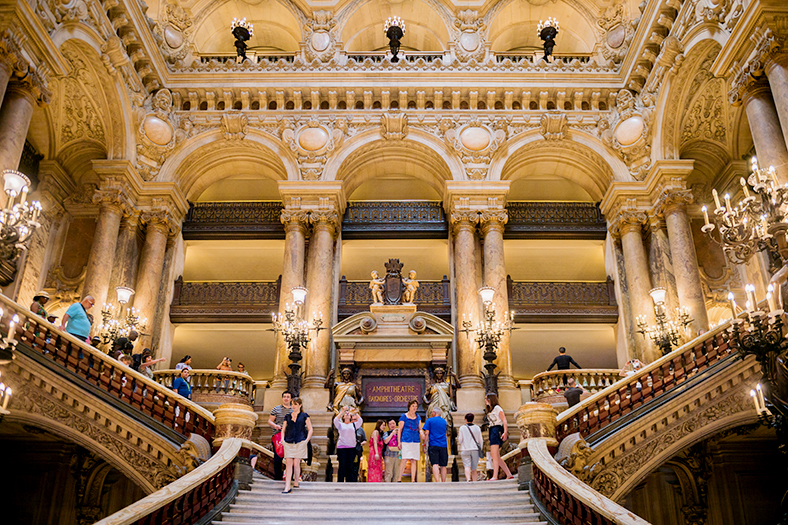
Nightclubs
Paris’ residential make-up means clubs aren’t ubiquitous. Still, electronica, laced with funk and groove, remains its strong suit. DJs tend to have short stints in venues – check www.tribudenuit. com. Salsa and Latino also maintain a huge following. Admission to clubs is free to around €20.
Jazz, Chansons & Cabarets
Paris has some fantastic venues for jazz and chansons (heartfelt, lyric-driven music typified by Édith Piaf). Tickets to major cabaret spectacles start from around €90 (from €200 with dinner) and may include a half-bottle of Champagne for an extra €10.
Opera, Ballet, Theatre & Classical Music
France’s Opéra National de Paris and Ballet de l’Opéra National de Paris perform at the Palais Garnier and Opéra Bastille opera houses. Virtually all theatre productions are in French but sometimes have English-language subtitles.
Cinema
Pariscope and L’Officiel des Spectacles list screening times; online check out http://cinema.leparisien.fr. Tickets cost around €11.50 for adults (€13.50 for 3D). Foreign films screened in their original language with French subtitles are labelled ‘VO’ (version originale); films labelled ‘VF’ (version française) are dubbed in French.
Best Nightclubs
Point Éphémère Edgy club and performance venue booking exceptional emerging and established DJs, artists and bands. Ubercool.
Le Rex Club Paris’ first dedicated techno club is still cutting edge and has a phenomenal sound system.
Social Club Subterranean nightclub with superb DJs and live bands.
Le Nouveau Casino Intimate concerts and top DJs play electro, pop, deep house and rock.
Best Jazz Clubs
Café Universel Brilliant array of live jazz and blues concerts.
Caveau de la Huchette Always entertaining medieval-cellar venue.
Best Cabarets
Moulin Rouge The home of the cancan is touristy but spectacular all the same.
Au Lapin Agile Historic and authentic, in the heart of Montmartre.
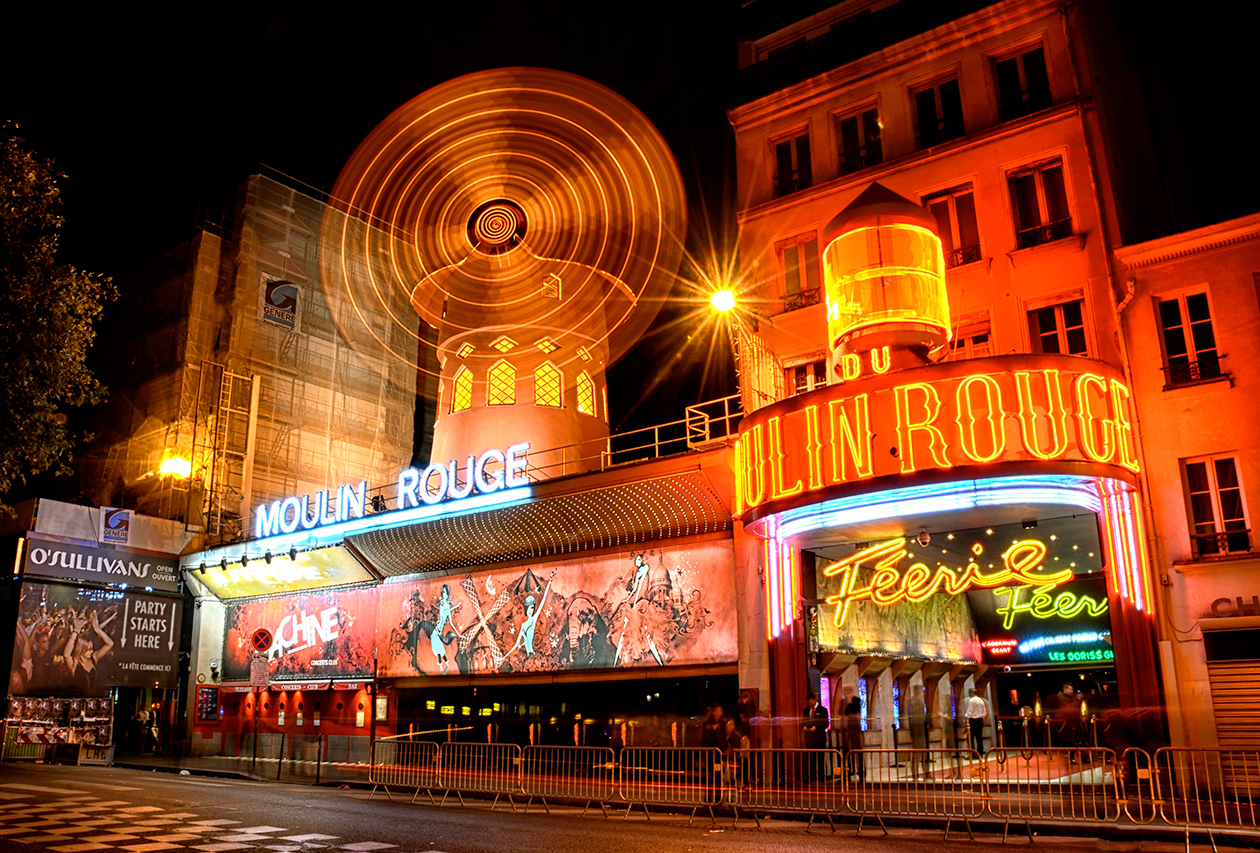
BestGay & Lesbian Paris
There’s less of a defined gay and lesbian ‘scene’ here than in other cities where it’s more underground. While Le Marais – particularly around the intersection of rues Ste-Croix de la Bretonnerie and des Archives – is the mainstay of gay and lesbian nightlife, venues throughout the city attract a mixed crowd.
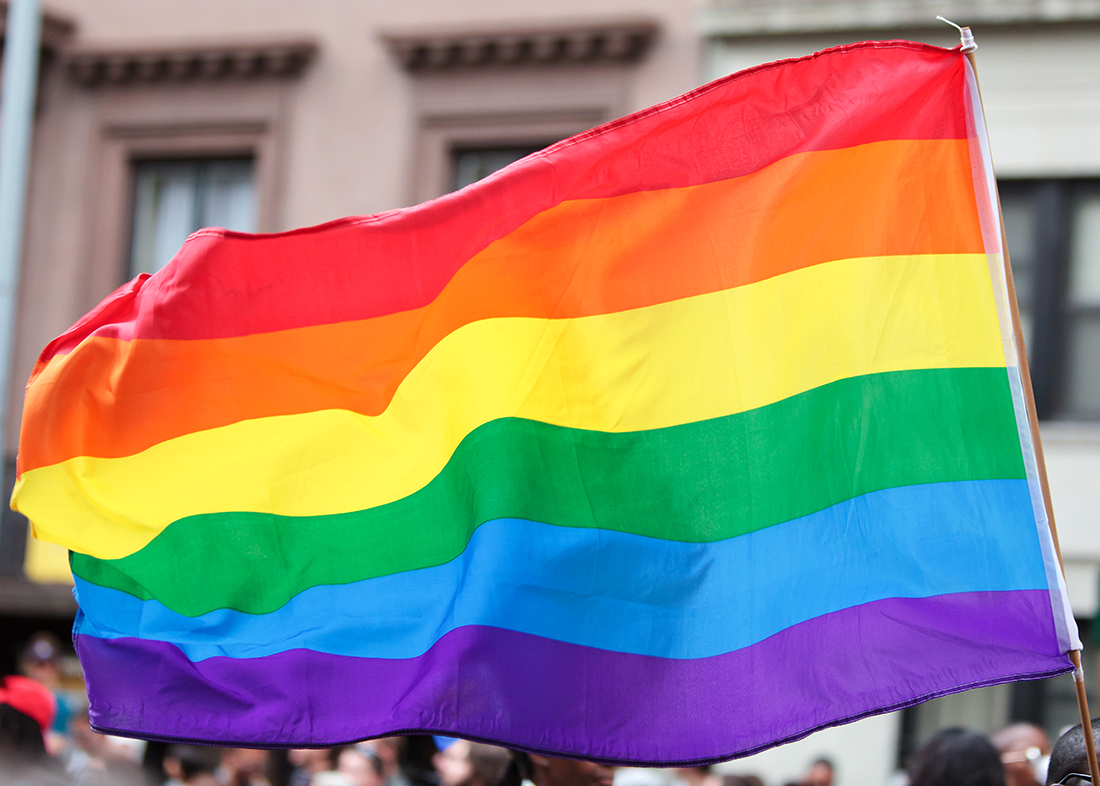
Background
Paris was the first-ever European capital to vote in an openly gay mayor when Bertrand Delanoë was elected in 2001, and the city itself is very open – same-sex couples commonly display affection in public and checking into a hotel room is unlikely to raise eyebrows. In 2013, France became the 13th country in the world to allow same-sex marriage (and adoption by same-sex couples). Typically, at least one partner needs to be a resident to get married here.
Festivities
Gay pride peaks during late June’s Gay Pride March (www.gaypride.fr), with over-the-top floats and festivities.
Gay Guided Tours
For an insider's perspective of gay life in Paris and recommendations on where to eat, drink, sightsee and party, take a tour with the Gay Locals (www.thegaylocals.com; 3hr tour from €180) – two long-time resident expats who lead tours of Le Marais in English, as well as private tours of other popular neighbourhoods and customised tours based on your interests.
BestFor Free
Paris’ national museums offer free entry on the first Sunday of the month (some during certain months only), and permanent exhibits at city museums are free (temporary exhibitions incur a charge). A handful of Paris’ national monuments also have free entry on the first Sunday of the month (also some in certain months only), including those listed below.
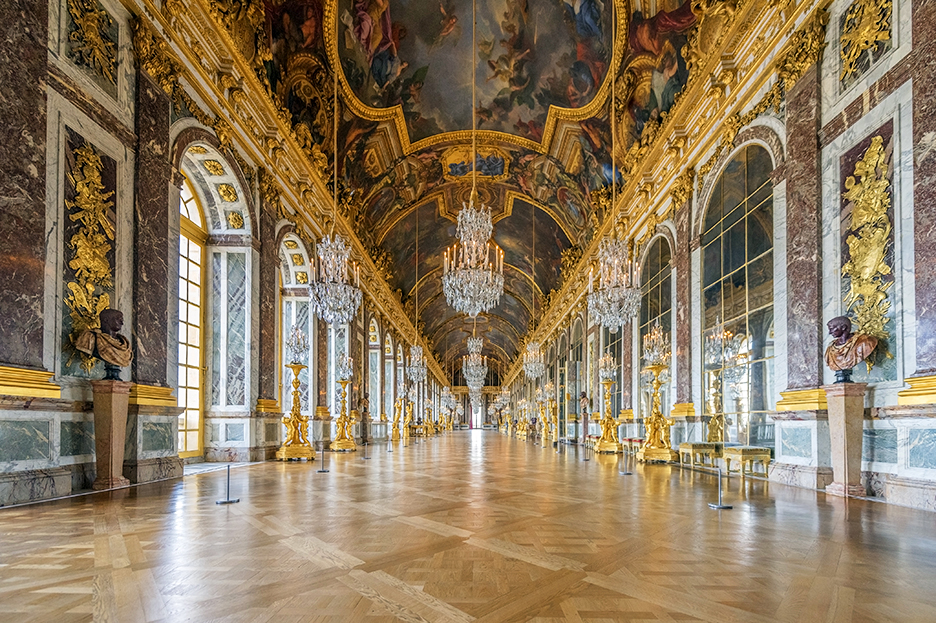
Free Music
Concerts, DJ sets and recitals regularly take place for free (or for the cost of a drink) at venues throughout the city.
Busking musicians and performers entertain crowds on Paris’ streets, squares and even aboard the metro.
Free Literary Events
This literary-minded city is an inspired place to catch a reading, author signing or writing workshop. English-language bookshops such as Shakespeare & Company and Abbey Bookshop host literary events throughout the year and can point you towards others.
Free Festivals
Loads of Paris’ festivals and events are free, such as the summertime Paris Plages riverside beaches. Catch free live-music gigs all over the city during the Fête de la Musique in mid-June. There's also many events during Nuit Blanche ('White Night', ie 'All Nighter') on the first Saturday and Sunday of October. For more, visit www.paris.fr.
Best Free Sights
Louvre Free entry on the first Sunday of the month October to March.
Arc de Triomphe Free entry to the top on the first Sunday of the month November to March.
Notre Dame Free entry to the towers on the first Sunday of the month November to March.
Versailles Free château entry on the first Sunday of the month November to March.
Père Lachaise This vast celebrity-filled cemetery is free to wander around.
BestFashion
Home to iconic labels like Chanel and Dior, Paris is a world trendsetter. Yet, although its well-groomed residents mean the city can look and feel like a giant catwalk, fashion here is about style and quality rather than status or brand names. Note most shops close at least one or two days a week, usually Sunday and Monday.
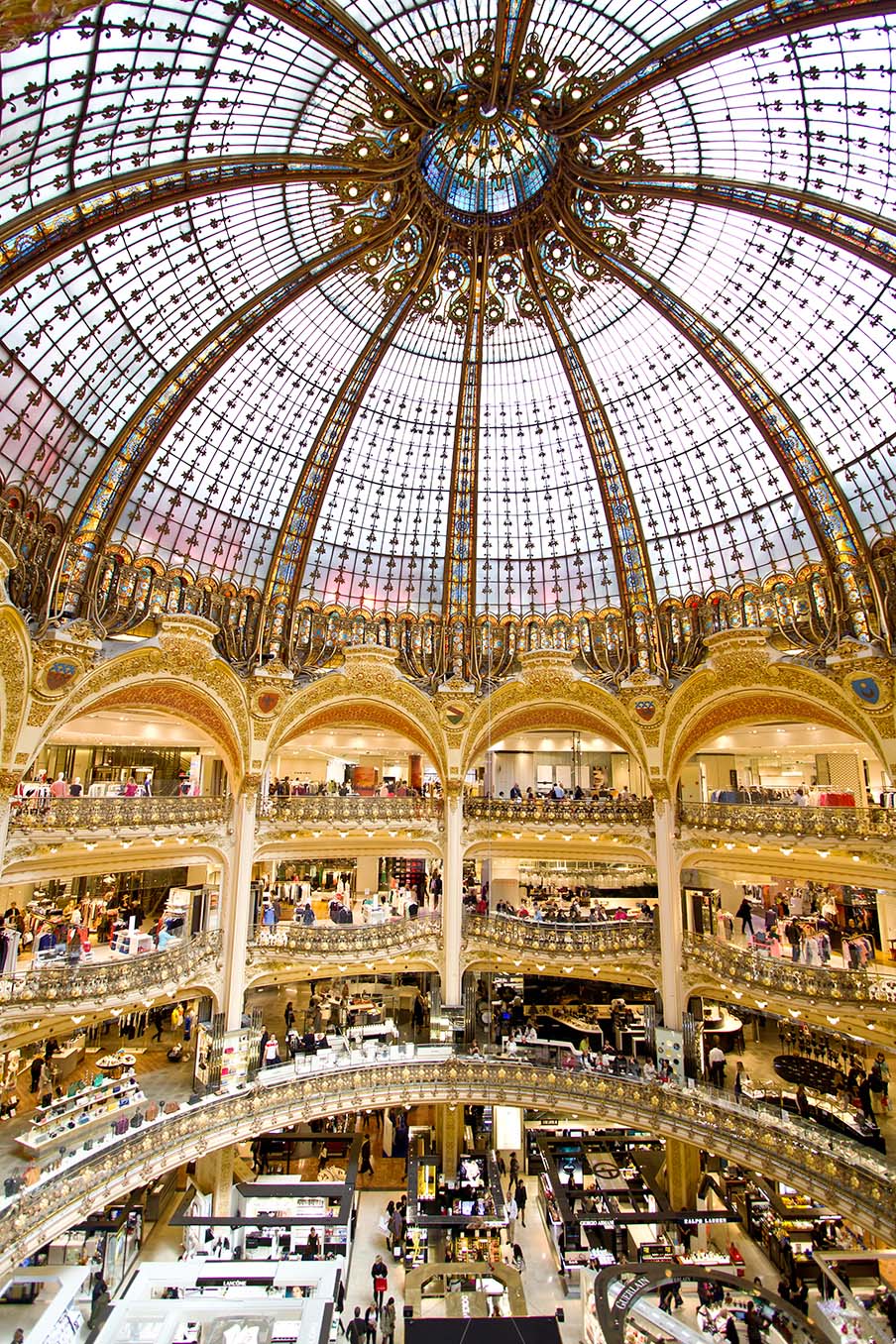
Fashion Districts
Shopping opportunities exist throughout the city, but certain neighbourhoods have especially concentrated options.
Look for luxury flagship stores in the Triangle d’Or (Golden Triangle; bordered by avs Georges V, Champs-Élysées and Montaigne) and St-Germain des Prés, particularly the northern wedge of the 6e between Église St-Germain des Prés and the Seine, as well as the western half of bd St-Germain and rue du Bac.
Paris' traditional garment-making district is the 2e around the metro station Sentier, and there are plenty of boutiques here and on nearby rue Montmartre and rue Tiquetonne, which are the places to find streetwear and avant-garde designs.
The hip Haut Marais and Canal St-Martin are fertile grounds for experimental designers.
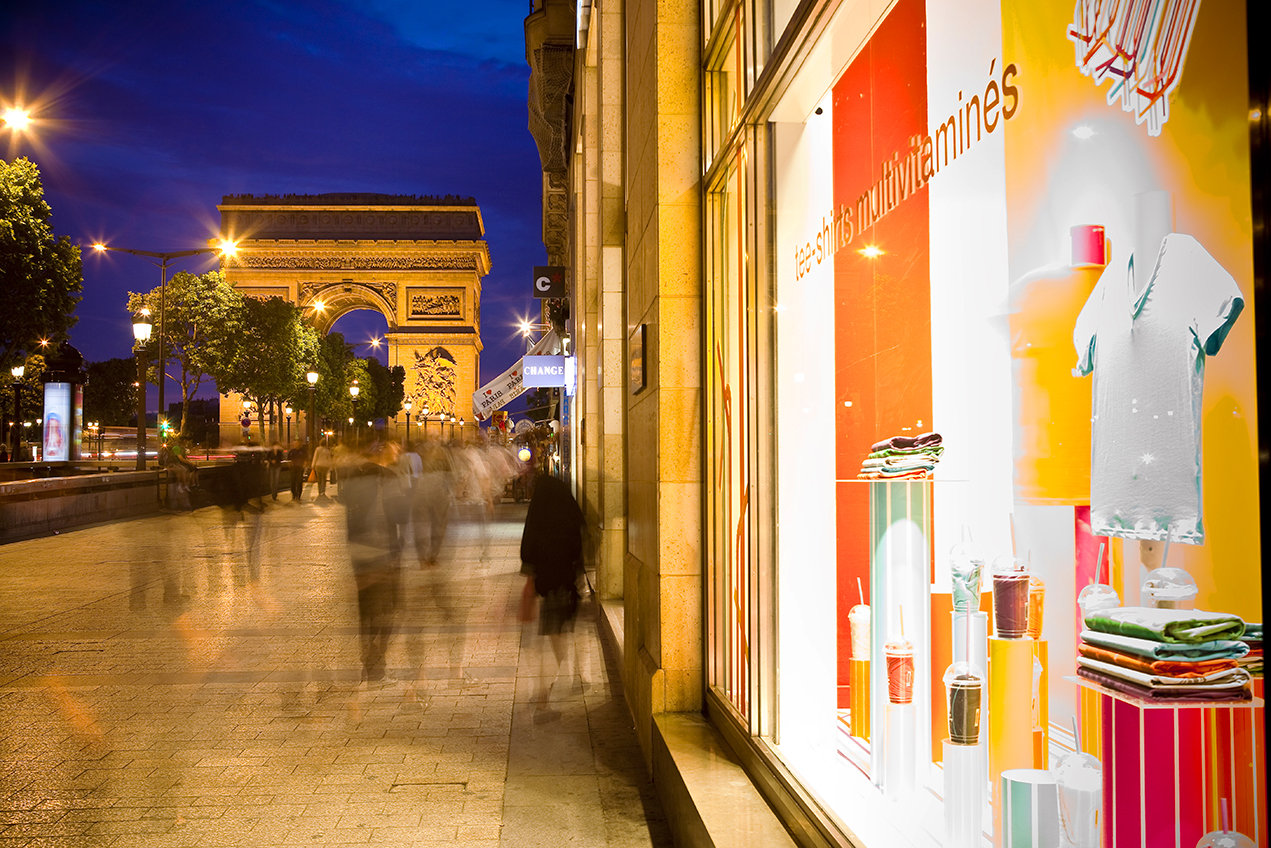
Arcades & Department Stores
Paris’ covered passages are treasure chests of exquisite boutiques, while the city’s grands magasins (department stores) such as Galeries Lafayette, Le Printemps and Le Bon Marché sell high-quality wares.
Speciality Shops
What sets Paris apart is its incredible array of speciality shops dedicated to individual items such as hats, gloves, handbags, umbrellas, stockings and tights, and chic children’s wear.
Best Boutiques
Maison Kitsuné The secret to looking effortlessly French.
La Boutique Extraordinaire Exquisite hand-knitted garments.
Pigalle Leading Parisian menswear brand.
Best Accessories
JB Guanti Gorgeous gloves.
Marie Mercié Handmade hats.
Alexandra Sojfer Handcrafted umbrellas.
Best Secondhand, Vintage & Discount Boutiques
Didier Ludot Couture creations of yesteryear.
L’Habilleur Discount designer wear.
Frivoli Brand-name cast-offs by the Canal St-Martin.
Kiliwatch New and used streetwear; vintage hats and boots.
Best Concept Stores
Merci Fabulously fashionable and unique: all profits go to a children’s charity in Madagascar.
Gab & Jo The country's first concept store stocking only French-made items.
Colette Uber-hip designer fashion and basement 'water bar'.
BestMulticultural Paris
Paris might be the bastion of French culture, but these days that definition incorporates myriad nationalities who call this cosmopolitan city home. Throughout the capital you’ll find vibrant hubs of cultural life that make up mondial (multicultural) Paris. Visiting grocery stores, delis, markets, shops and places of worship as you explore the city offers a mini world tour.
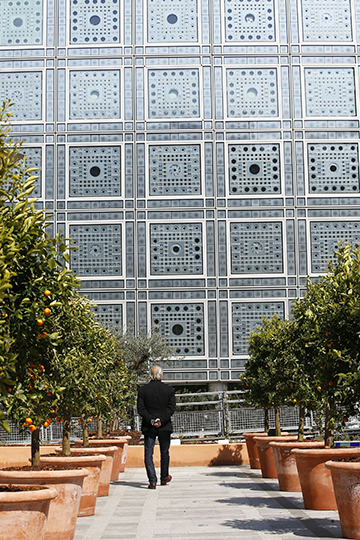
Multicultural Background
Waves of immigration over the centuries, including a large number of immigrants from France’s former colonies since the middle of last century, have given rise to an exhilarating mix of ethnicities, cuisines and the arts – and to debates like the 2004 ban at state-run schools on Muslim headscarves (and all other religious symbols, such as crucifixes) in favour of secularism, and the controversial 2011 ban on women wearing burqas in public (France was the first European country to impose one). Under French law, censuses can’t ask questions about ethnicity or religion, but they do collect country-of-birth statistics, which confirm Paris as one of the most multicultural cities in Europe.
Best Mondial Museums
Musée du Quai Branly Indigenous art, artefacts, music and more from every continent bar Europe.
Institut du Monde Arabe Arabian arts are displayed in stunning surrounds; also hosts concerts and film screenings.
Musée Guimet des Arts Asiatiques Exceptional collection of Asian art and artefacts.
Louvre Antiquities from Greece and Egypt and other extraordinary global treasures.
BestTours
Parisien d’un jour – Paris Greeters (www.greeters.paris; by donation) See Paris through local eyes with these two- to three-hour city tours. Volunteers – knowledgeable Parisians passionate about their city in the main – lead groups (maximum six people) to their favourite spots. Minimum two weeks' notice needed.
Paris Walks (![]() %01 48 09 21 40; www.paris-walks.com; 2hr tours adult/child €15/8) Long established and well respected, Paris Walks offers two-hour thematic walking tours (art, fashion, chocolate, the French Revolution etc).
%01 48 09 21 40; www.paris-walks.com; 2hr tours adult/child €15/8) Long established and well respected, Paris Walks offers two-hour thematic walking tours (art, fashion, chocolate, the French Revolution etc).
Fat Tire Bike Tours (![]() %01 85 08 19 76; www.fattirebiketours.com; tours from €32) Day and night bike tours of the city, both in central Paris and further afield to Versailles and Monet's Garden in Giverny.
%01 85 08 19 76; www.fattirebiketours.com; tours from €32) Day and night bike tours of the city, both in central Paris and further afield to Versailles and Monet's Garden in Giverny.
Set in Paris (
GOOGLE MAP
; ![]() %09 84 42 35 79; www.setinparis.com; 3 rue Maître Albert, 5e; 2hr tours €25;
%09 84 42 35 79; www.setinparis.com; 3 rue Maître Albert, 5e; 2hr tours €25; ![]() h2hr tours 10am & 3pm;
h2hr tours 10am & 3pm; ![]() mMaubert-Mutualité) From its cinema-style 'box office' HQ in the Latin Quarter, Set in Paris' two-hour walking tours take you to locations throughout Paris where movies including The Devil Wears Prada, The Bourne Identity, The Three Musketeers, The Hunchback of Notre Dame, Ratatouille, Before Sunset, several James Bond instalments and many others were filmed. Advance reservations are recommended.
mMaubert-Mutualité) From its cinema-style 'box office' HQ in the Latin Quarter, Set in Paris' two-hour walking tours take you to locations throughout Paris where movies including The Devil Wears Prada, The Bourne Identity, The Three Musketeers, The Hunchback of Notre Dame, Ratatouille, Before Sunset, several James Bond instalments and many others were filmed. Advance reservations are recommended.
Canauxrama (
GOOGLE MAP
; www.canauxrama.com; opposite 50 bd de la Bastille, 12e, Port de l'Arsenal; adult/child €18/9; ![]() mBastille) Runs 2½-hour trips along the Canal St-Martin, chugging back and forth between central Paris and Parc de la Villette. Boats go at a leisurely pace, passing through four double locks, two swing bridges and an underground section (with an art installation).
mBastille) Runs 2½-hour trips along the Canal St-Martin, chugging back and forth between central Paris and Parc de la Villette. Boats go at a leisurely pace, passing through four double locks, two swing bridges and an underground section (with an art installation).
L’Open Tour (![]() %01 42 66 56 56; www.paris.opentour.com; 1-day pass adult/child €32/16) Hop-on, hop-off bus tours aboard open-deck buses with four different circuits and 50 stops – good for a whirlwind city tour.
%01 42 66 56 56; www.paris.opentour.com; 1-day pass adult/child €32/16) Hop-on, hop-off bus tours aboard open-deck buses with four different circuits and 50 stops – good for a whirlwind city tour.
Localers (![]() %01 83 64 92 01; www.localers.com) Classic walking tours and behind-the-scenes urban discoveries with local Paris experts: pétanque, photo shoots, market tours, cooking classes, foie gras–tasting et al.
%01 83 64 92 01; www.localers.com) Classic walking tours and behind-the-scenes urban discoveries with local Paris experts: pétanque, photo shoots, market tours, cooking classes, foie gras–tasting et al.
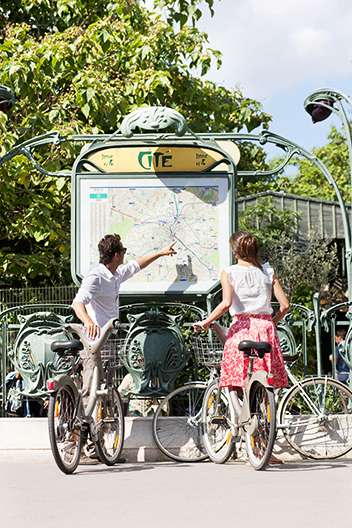
BestCooking & Wine-Tasting Courses
If dining in the city’s restaurants whets your appetite, Paris has stacks of cookery schools with courses for all budgets and levels of ability. Where there’s food in Paris, wine is never more than an arm’s length away; plenty of places offer wine tastings and instruction for beginners through to connoisseurs.
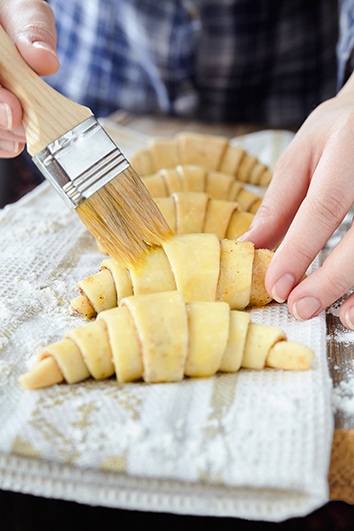
Best Culinary Classes
Cook’n With Class (
GOOGLE MAP
; ![]() %01 42 57 22 84; www.cooknwithclass.com; 6 rue Baudelique, 18e;
%01 42 57 22 84; www.cooknwithclass.com; 6 rue Baudelique, 18e; ![]() mJules Joffrin) International chefs, small classes.
mJules Joffrin) International chefs, small classes.
Le Cordon Bleu (
GOOGLE MAP
; ![]() %01 85 65 15 00; www.cordonbleu.edu/paris; 13-15 quai André Citroën, 15e;
%01 85 65 15 00; www.cordonbleu.edu/paris; 13-15 quai André Citroën, 15e; ![]() mJavel–André Citroën, RER Javel) One of the world’s foremost culinary-arts schools.
mJavel–André Citroën, RER Javel) One of the world’s foremost culinary-arts schools.
La Cuisine Paris (
GOOGLE MAP
; ![]() %01 40 51 78 18; www.lacuisineparis.com; 80 quai de l'Hôtel de Ville, 4e;
%01 40 51 78 18; www.lacuisineparis.com; 80 quai de l'Hôtel de Ville, 4e; ![]() mPont Marie, Hôtel de Ville) Courses from bread, croissants and macarons to market classes and ‘foodie walks’.
mPont Marie, Hôtel de Ville) Courses from bread, croissants and macarons to market classes and ‘foodie walks’.
Le Foodist (
GOOGLE MAP
; ![]() %06 71 70 95 22; www.lefoodist.com; 59 rue du Cardinal Lemoine, 5e;
%06 71 70 95 22; www.lefoodist.com; 59 rue du Cardinal Lemoine, 5e; ![]() mCardinal Lemoine) Cooking classes and wine pairings.
mCardinal Lemoine) Cooking classes and wine pairings.
Best Wine Appreciation Sessions
Ô Château (
GOOGLE MAP
; www.o-chateau.com; 68 rue Jean-Jacques Rousseau, 1er; ![]() h4pm-midnight Mon-Sat;
h4pm-midnight Mon-Sat; ![]() W;
W; ![]() mLes Halles, Étienne Marcel) Wine aficionados can thank this young, fun, cosmopolitan bar à vins for bringing affordable tasting to Paris.
mLes Halles, Étienne Marcel) Wine aficionados can thank this young, fun, cosmopolitan bar à vins for bringing affordable tasting to Paris.
Musée du Vin (
GOOGLE MAP
; ![]() %01 45 25 63 26; www.museeduvinparis.com; 5 sq Charles Dickens, 16e; adult/child €10/free;
%01 45 25 63 26; www.museeduvinparis.com; 5 sq Charles Dickens, 16e; adult/child €10/free; ![]() h10am-6pm Tue-Sun;
h10am-6pm Tue-Sun; ![]() mPassy) In addition to its displays, Paris’ wine museum offers instructive tastings.
mPassy) In addition to its displays, Paris’ wine museum offers instructive tastings.
Wine Tasting in Paris (
GOOGLE MAP
; ![]() %06 76 93 32 88; www.wine-tasting-in-paris.com; 14 rue des Boulangers, 5e; 2hr tastings from €60;
%06 76 93 32 88; www.wine-tasting-in-paris.com; 14 rue des Boulangers, 5e; 2hr tastings from €60; ![]() htastings 5-7pm Tue, Thu & Sat;
htastings 5-7pm Tue, Thu & Sat; ![]() mJussieu) Tastings include the popular French Wine Tour (two hours, six wines), covering tasting methodology, wine vocabulary, and interpreting wine labels as well as French wine-growing regions.
mJussieu) Tastings include the popular French Wine Tour (two hours, six wines), covering tasting methodology, wine vocabulary, and interpreting wine labels as well as French wine-growing regions.